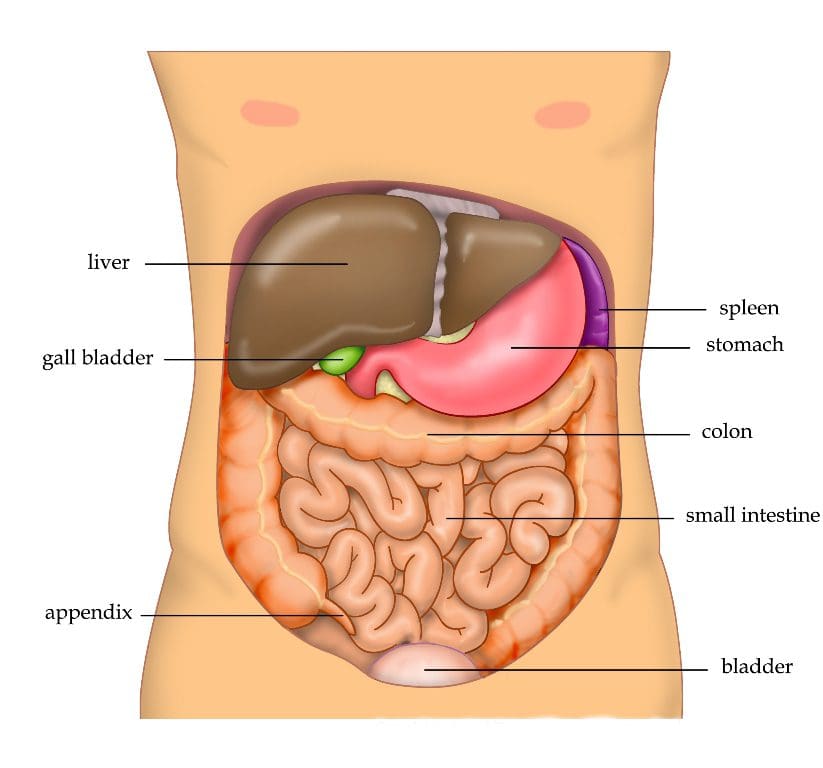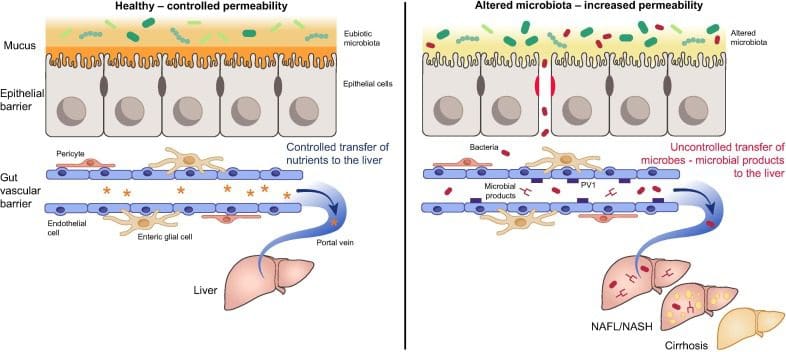Table of Contents
Introduction
Everyone has different tips and tricks for being healthy and losing weight. Many individuals incorporate other diets, eating habits, and exercise regimes to lose excess weight, have energy throughout the day and feel good. One of the other diets many people seem to lean toward when it comes to losing weight and helping the body is detox. Surprisingly, many people seem misinformed about detox and dieting being the same; however, they are not, as detoxing is a natural process of body purification while dieting incorporates healthy eating habits, exercising, and healthy life choices. For the body, the best detoxing machine is the liver. Today’s article looks at how the liver detoxes the body, how factors can cause detox imbalances in the body, and how different food helps liver detoxification. We refer patients to certified providers specializing in liver or gastrointestinal treatments to help many individuals with liver issues. We also guide our patients by referring to our associated medical providers based on their examination when it’s appropriate. We find that education is the solution to asking our providers insightful questions. Dr. Alex Jimenez DC provides this information as an educational service only. Disclaimer
The Body’s Own Detox Machine: The Liver
Have you been experiencing gut sensitivities from the foods you eat? How about experiencing chronic fatigue throughout the entire day? What about experiencing pain and swelling in your abdominals or legs? Some of these issues may indicate that something is wrong with your liver. The liver is the most crucial organ with a massive responsibility for the vast array of functions of the body. The liver helps support many visceral functions like maintaining the body’s metabolism, immunity, digestion, and detoxification. Detoxification is a biochemical process where non-water-soluble compounds are transformed into water-soluble compounds flushed out of the body. The benefit of detox is that it helps protect the body from adverse effects of external and internal toxins.
Since the liver is a massive organ, its essential role in the body is detoxification. Studies reveal that the detoxification process for the liver is in two phases. Phase 1 activated the enzymes in the body to prepare the substance to be removed. Phase 2 excretes the enzymes out of the body as urine, stool, and bile. These two phases help keep the body healthy and stop excessive toxins from harming the rest of the body.
The Lymphatic System
The lymphatic system is one of the central detoxification systems responsible for allowing waste products to leave and be carried away to the bloodstream, becoming one of the defense mechanisms for the body and purifying the body fluids for proper functioning. The lymphatic vasculatures also play an active role in immune regulation by impacting inflammatory and immune responses. This means that the lymphatic will produce white blood cells to attack foreign invaders entering the body.
The Gut-Liver Axis
Since the liver is the master organ for detoxification, what is its relationship with the gut? Well, studies reveal that the gut microbiota forms a complex microbial community that significantly impacts human health. The gut microbiota can indirectly modulate the functionality of the extra-intestinal organs, which involves the liver. The gut connects to the liver with the intestines through bile acid metabolism. When there is a decrease in bile acid in the gut, it could trigger hepatic inflammation via inflammasomes. Inflammasomes are an essential component of innate immune response while being critical for the clearance of pathogens or damaged cells. When the inflammasomes start becoming mediators for hepatic inflammation, they could potentially be involved with detoxification imbalances in the body.
Detoxification Imbalances
When there are decreased bile acids in the gut, the body could be at risk of developing intestinal dysbiosis. This causes impaired intestinal barrier function, which overlaps to leaky gut and aggravates hepatic inflammation in the liver. When this happens, toxins in the body become excessive and may cause immune and nervous system abnormalities while triggering imbalanced detoxification symptoms that correspond to issues similar to chronic conditions. Some of these detoxification imbalances include:
- Fatigue
- Allergies/intolerances
- Sluggish metabolism
- Weight gain easily
- Intolerance to fats
- Puffy – excess fluid
- Body odor, bad breath, metallic taste
- Profuse sweating even in cool weather
Naturally Detoxing Your Body-Video
Have you been dealing with allergies or food intolerances affecting your abdominals? Have you been feeling sluggish? What about feeling chronic fatigue throughout the entire day? Some of these symptoms are signs that your liver could suffer from some issues. The liver’s primary function in the body is to detoxify the body. The video above explains how the liver detoxifies the body and how drinks to cleanse the body don’t add additional benefits. The best way for a healthy liver to be functional and detox the body naturally is by eating the right foods that help support the liver, exercising regularly, drinking plenty of water to flush out the system, and getting adequate sleep.
Foods That Support Liver Detoxification
When it comes to supporting the liver, eating the right foods can provide energy and reduce inflammatory effects on the body. Studies reveal that eating various wild and semidomestic food plants can provide various components to liver function. Plants like dandelions contain taxasterols, which have antioxidant and anti-inflammatory properties that allow the liver to increase bile secretion. Other foods that help with liver functionality associated with other body functions include:
- Berries (blueberries & cranberries)
- Grapefruit
- Prickly pear
- Cruciferous vegetables
- Garlic
- Carrots
- Beets
- Olive oil
- Nuts
Incorporating these healthy foods can not only be beneficial to the liver but can help the major organs and body to receive the nutrients that the body deserves.
Conclusion
The liver is a massive organ that helps the body to function correctly by harmful detoxifying pathogens through excretion. As a natural detoxifying machine, the liver has a casual relationship with the gut system by filtering the nutrients and transporting them out to different body areas. Harmful pathogens enter the body and disrupt the liver can lead to dysbiosis and liver dysfunction. Fortunately, there are nutritious foods that can help support the liver and even help flush out the toxins over time so the body can begin its healing process naturally.
References
Grant, D M. “Detoxification Pathways in the Liver.” Journal of Inherited Metabolic Disease, U.S. National Library of Medicine, 1991, https://pubmed.ncbi.nlm.nih.gov/1749210/.
Guan, Yong-Song, and Qing He. “Plants Consumption and Liver Health.” Evidence-Based Complementary and Alternative Medicine : ECAM, Hindawi Publishing Corporation, 2015, https://www.ncbi.nlm.nih.gov/pmc/articles/PMC4499388/.
Karla, Arjun, et al. “Physiology, Liver – Statpearls – NCBI Bookshelf.” In: StatPearls [Internet]. Treasure Island (FL), StatPearls Publishing, 8 May 2022, https://www.ncbi.nlm.nih.gov/books/NBK535438/.
Konturek, Peter Christopher, et al. “Gut?Liver Axis: How Do Gut Bacteria Influence the Liver?” Medical Sciences (Basel, Switzerland), MDPI, 17 Sept. 2018, https://www.ncbi.nlm.nih.gov/pmc/articles/PMC6165386/.
Sharma, Deepika, and Thirumala-Devi Kanneganti. “The Cell Biology of Inflammasomes: Mechanisms of Inflammasome Activation and Regulation.” The Journal of Cell Biology, The Rockefeller University Press, 20 June 2016, https://www.ncbi.nlm.nih.gov/pmc/articles/PMC4915194/.
Disclaimer
Post Disclaimer
Professional Scope of Practice *
The information herein on "The Body's Natural Detox Machine: The Liver" is not intended to replace a one-on-one relationship with a qualified health care professional or licensed physician and is not medical advice. We encourage you to make healthcare decisions based on your research and partnership with a qualified healthcare professional.
Blog Information & Scope Discussions
Welcome to El Paso's Premier Wellness, Personal Injury Care Clinic & Wellness Blog, where Dr. Alex Jimenez, DC, FNP-C, a Multi-State board-certified Family Practice Nurse Practitioner (FNP-BC) and Chiropractor (DC), presents insights on how our multidisciplinary team is dedicated to holistic healing and personalized care. Our practice aligns with evidence-based treatment protocols inspired by integrative medicine principles, similar to those found on this site and our family practice-based chiromed.com site, focusing on restoring health naturally for patients of all ages.
Our areas of multidisciplinary practice include Wellness & Nutrition, Chronic Pain, Personal Injury, Auto Accident Care, Work Injuries, Back Injury, Low Back Pain, Neck Pain, Migraine Headaches, Sports Injuries, Severe Sciatica, Scoliosis, Complex Herniated Discs, Fibromyalgia, Chronic Pain, Complex Injuries, Stress Management, Functional Medicine Treatments, and in-scope care protocols.
Our information scope is multidisciplinary, focusing on musculoskeletal and physical medicine, wellness, contributing etiological viscerosomatic disturbances within clinical presentations, associated somato-visceral reflex clinical dynamics, subluxation complexes, sensitive health issues, and functional medicine articles, topics, and discussions.
We provide and present clinical collaboration with specialists from various disciplines. Each specialist is governed by their professional scope of practice and their jurisdiction of licensure. We use functional health & wellness protocols to treat and support care for musculoskeletal injuries or disorders.
Our videos, posts, topics, and insights address clinical matters and issues that are directly or indirectly related to our clinical scope of practice.
Our office has made a reasonable effort to provide supportive citations and has identified relevant research studies that support our posts. We provide copies of supporting research studies upon request to regulatory boards and the public.
We understand that we cover matters that require an additional explanation of how they may assist in a particular care plan or treatment protocol; therefore, to discuss the subject matter above further, please feel free to ask Dr. Alex Jimenez, DC, APRN, FNP-BC, or contact us at 915-850-0900.
We are here to help you and your family.
Blessings
Dr. Alex Jimenez DC, MSACP, APRN, FNP-BC*, CCST, IFMCP, CFMP, ATN
email: [email protected]
Multidisciplinary Licensing & Board Certifications:
Licensed as a Doctor of Chiropractic (DC) in Texas & New Mexico*
Texas DC License #: TX5807, Verified: TX5807
New Mexico DC License #: NM-DC2182, Verified: NM-DC2182
Multi-State Advanced Practice Registered Nurse (APRN*) in Texas & Multi-States
Multistate Compact APRN License by Endorsement (42 States)
Texas APRN License #: 1191402, Verified: 1191402 *
Florida APRN License #: 11043890, Verified: APRN11043890 *
License Verification Link: Nursys License Verifier
* Prescriptive Authority Authorized
ANCC FNP-BC: Board Certified Nurse Practitioner*
Compact Status: Multi-State License: Authorized to Practice in 40 States*
Graduate with Honors: ICHS: MSN-FNP (Family Nurse Practitioner Program)
Degree Granted. Master's in Family Practice MSN Diploma (Cum Laude)
Dr. Alex Jimenez, DC, APRN, FNP-BC*, CFMP, IFMCP, ATN, CCST
My Digital Business Card
RN: Registered Nurse
APRNP: Advanced Practice Registered Nurse
FNP: Family Practice Specialization
DC: Doctor of Chiropractic
CFMP: Certified Functional Medicine Provider
MSN-FNP: Master of Science in Family Practice Medicine
MSACP: Master of Science in Advanced Clinical Practice
IFMCP: Institute of Functional Medicine
CCST: Certified Chiropractic Spinal Trauma
ATN: Advanced Translational Neutrogenomics








 Again, We Welcome You.
Again, We Welcome You.
Comments are closed.